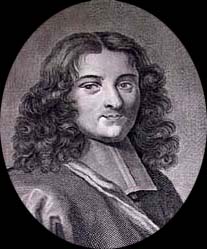Pierre Bayle: On Religion
The writings of the French Protestant scholar Pierre Bayle (1647-1706) anticipated and inspired the Enlightenment philosophers, especially with respect to religion.
 If a multiplicity of religions is harmful to the state, that is only because one religion will not tolerate the other but wants rather to swallow it up by dint of persecution […] that is where the trouble begins. If each religion adopted the spirit of tolerance that I recommend, there would be the same concord in a state with ten religions as in a city in which different artisans and craftsmen mutually support one another. The most that could happen would be honest rivalry in outdoing one another in piety, good conduct and knowledge; each religion would take pride in proving its favoured share of God’s love by exhibiting a firmer attachment to moral conduct; all would boast of greater love for their country, if the sovereign protected them all and through his justice kept them in balance. Such handsome emulation would give rise to innumerable blessings; consequently toleration is of all things the most conductive to the return of the golden age [...]. What then prevents this beautiful concert composed of such different voices and tones? It is only because one of the two religions wants to exercise cruel tyranny over men’s minds and force others to act against their conscience; [...]; in short, the whole disorder springs not from toleration but from non-toleration.
If a multiplicity of religions is harmful to the state, that is only because one religion will not tolerate the other but wants rather to swallow it up by dint of persecution […] that is where the trouble begins. If each religion adopted the spirit of tolerance that I recommend, there would be the same concord in a state with ten religions as in a city in which different artisans and craftsmen mutually support one another. The most that could happen would be honest rivalry in outdoing one another in piety, good conduct and knowledge; each religion would take pride in proving its favoured share of God’s love by exhibiting a firmer attachment to moral conduct; all would boast of greater love for their country, if the sovereign protected them all and through his justice kept them in balance. Such handsome emulation would give rise to innumerable blessings; consequently toleration is of all things the most conductive to the return of the golden age [...]. What then prevents this beautiful concert composed of such different voices and tones? It is only because one of the two religions wants to exercise cruel tyranny over men’s minds and force others to act against their conscience; [...]; in short, the whole disorder springs not from toleration but from non-toleration.
Pierre Bayle (1686) A Philosophical Commentary on These Words of the Gospel, Luke 14.23, ‘Compel Them to Come In, That My House May Be Full’.
 If a multiplicity of religions is harmful to the state, that is only because one religion will not tolerate the other but wants rather to swallow it up by dint of persecution […] that is where the trouble begins. If each religion adopted the spirit of tolerance that I recommend, there would be the same concord in a state with ten religions as in a city in which different artisans and craftsmen mutually support one another. The most that could happen would be honest rivalry in outdoing one another in piety, good conduct and knowledge; each religion would take pride in proving its favoured share of God’s love by exhibiting a firmer attachment to moral conduct; all would boast of greater love for their country, if the sovereign protected them all and through his justice kept them in balance. Such handsome emulation would give rise to innumerable blessings; consequently toleration is of all things the most conductive to the return of the golden age [...]. What then prevents this beautiful concert composed of such different voices and tones? It is only because one of the two religions wants to exercise cruel tyranny over men’s minds and force others to act against their conscience; [...]; in short, the whole disorder springs not from toleration but from non-toleration.
If a multiplicity of religions is harmful to the state, that is only because one religion will not tolerate the other but wants rather to swallow it up by dint of persecution […] that is where the trouble begins. If each religion adopted the spirit of tolerance that I recommend, there would be the same concord in a state with ten religions as in a city in which different artisans and craftsmen mutually support one another. The most that could happen would be honest rivalry in outdoing one another in piety, good conduct and knowledge; each religion would take pride in proving its favoured share of God’s love by exhibiting a firmer attachment to moral conduct; all would boast of greater love for their country, if the sovereign protected them all and through his justice kept them in balance. Such handsome emulation would give rise to innumerable blessings; consequently toleration is of all things the most conductive to the return of the golden age [...]. What then prevents this beautiful concert composed of such different voices and tones? It is only because one of the two religions wants to exercise cruel tyranny over men’s minds and force others to act against their conscience; [...]; in short, the whole disorder springs not from toleration but from non-toleration.Pierre Bayle (1686) A Philosophical Commentary on These Words of the Gospel, Luke 14.23, ‘Compel Them to Come In, That My House May Be Full’.